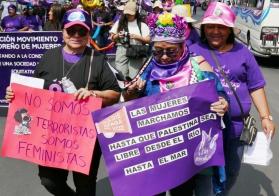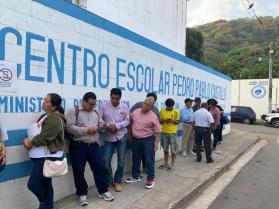Passage of Proposed Reconciliation Law Looks Murky
In less than a month, on November 13th, the clock will strike for the Legislative Assembly to produce a national reconciliation law intended to redress grave human rights abuses committed during the Salvadoran armed conflict (1980 – 1992). As part of its 2016 ruling striking down the 1993 Amnesty Law as unconstitutional, the Constitutional Chamber of the Supreme Court charged the Legislative Assembly with creating a new law to take its place. After an attempt to pass a controversial bill this May that would have replaced prison sentences for community service in some cases, a national consultation process that followed in its wake has fallen short according to human rights organizations and victims’ associations in El Salvador. Now that the consultations have ended, the social movement has reiterated that they will not accept a law that does not center the demands of victims and comply with the Supreme Court ruling.
The now-unconstitutional General Amnesty Law for the Consolidation of Peace (Ley de Amnistía General para la Consolidación de la Paz) first became law on March 22, 1993, five days after the release of the United Nations’ Truth Commission’s report on the Salvadoran Civil War, which attributed at least 85% of human rights violations to government and paramilitary forces. The Amnesty Law, which was proposed and voted through by the right-wing parties that controlled the Assembly, provided “complete, absolute and unconditional” amnesty for all crimes committed during the war.
After decades of advocacy by human rights organizations in El Salvador and international allies, as well as by the FMLN party, the Supreme Court’s Constitutional Chamber ruled it to be unconstitutional in 2016. The Office of the UN High Commissioner for Human Rights celebrated the ruling as a “historic decision for the country [that] gives hope to the victims and confidence in the legal system.” Numerous high-profile cases have since been re-opened, including the massacre in El Mozote, the massacre of Jesuits at the University of Central America, and the assassination of Saint Romero.
Overturning the 1993 Amnesty Law left in place the 1992 National Reconciliation Law, which, as part of the Peace Accords process, created a blanket amnesty for all “common political crimes” that occurred in the context of war. The Reconciliation Law specifies, however, that this amnesty is “not extended to people who, according to the Truth Commission report, have participated in grave acts of violence since January 1, 1980, that have left a mark on society that demands that the truth be urgently brought to light, independently of which sector committed it.”
The Chamber charged the Assembly with crafting a law to address such grave acts of violence and to guarantee justice for the victims, which the legislation on the books fails to do. As David Morales, former Human Rights Ombudsman, explained, “The Constitutional Chamber ordered investigations into crimes against humanity and war crimes from that era. It also ordered the Legislative Assembly to enact mechanisms in order to strengthen the criminal investigation of these cases and facilitate access to all available public information about military operations in which such crimes were committed.” The ruling also emphasized the responsibility of the state to provide reparations to victims.
For nearly two years, there was little momentum in the Assembly until an Ad-Hoc Commission was formed on June 14, 2018 to study the implications of the ruling. Soon after, the Chamber gave the Assembly a deadline of July 13 to approve a new law.
Immediately after the Ad-Hoc Commission was formed, however, victims’ associations and human rights organizations began to raise red flags. As former Human Rights Ombudsman Morales noted, four of the five members of the Ad-Hoc Commission were “direct actors in the armed conflict.” Two were former military chiefs, General Mauricio Vargas of the ARENA party and Coronel Antonio Almendarez of the PCN. Rodolfo Parker of the Cristian Democrats (PDC), president of the Commission, had been a high-ranking advisor to the Armed Forces, and was named by the UN Truth Commission as having covered up the Jesuit massacre. Nidia Díaz, representing the FMLN, was a former guerrilla commander.
The Group against Impunity in El Salvador, a coalition of 17 human rights and civil society organizations, quickly filed a case with the Governmental Ethics Tribunal in July 2018 regarding clear conflicts of interest. The Tribunal rejected the claim in November.
During its deliberation, the Ad-Hoc Commission did not consider a proposal from human rights organizations and victims’ associations including Pro-Búsqueda and CO-MADRES, the Comprehensive Reparation Act for Victims of the Armed Conflict. The FMLN’s Nidia Díaz had introduced the proposal during the previous legislative session but did not do so again.
Media reports at the time also highlighted conflicts between Díaz and Rodolfo Parker, president of the Ad-Hoc Commission, for example, advocating for the UN Truth Commission report to be the basis to open investigations, as victims’ associations have called for, and Parker opposing.
In February 2019, Parker presented his proposed National Reconciliation Law, which offered “unconditional and absolute” amnesty for all crimes except crimes against humanity or war crimes, the punishment for which would be public service, not jail time or civil charges. The level of national and international outcry, including from United Nations High Commissioner for Human Rights Michelle Bachelet, forced Parker to step down from the commission a month later.
The FMLN also spoke out against Parker’s proposal, saying, “We don’t support any proposal that doesn’t include the victims’ position or that generates impunity.” Instead, they pledged to seek a law “based on truth, justice, comprehensive reparations for victims and which would guarantee mechanisms so as not to repeat the past and so that our society can have reconciliation and live in Peace.”
At an impasse, the ad-hoc commission dissolved in May without proposing a bill. Instead they issued a report to the Assembly’s Political Commission. According to Diaz, “In the report we suggest that this matter be taken up by the Political Commission. I think this will also alleviate the concerns of various victims who questioned the make-up of the commission. We are wrapping up and passing on results – not a proposal in the form of a bill but more in terms of the issues.”
Following the dissolution of the Ad-Hoc Commission, the Assembly formed a new subcommittee to pick up where they had left off. The subcommittee is composed of Julio Fabián of ARENA, Damián Alegría of the FMLN, Guillermo Gallegos of GANA, Jorge Mazariego of the PDC, Juan José Martel of CD and coordinator Roberto Angulo of the PCN, who, notably, is one of the nine original sponsors of the 1993 Amnesty Law.
On May 21, 2019, representatives of victims’ associations presented a proposal to the new subcommittee, the “Special Law for Comprehensive Reparations and Access to Justice for Victims of Grave Human Rights Violations during the Armed Conflict,” which seeks to guarantee truth, justice and reparations to victims, including by ensuring public access to the currently-sealed files of the UN Truth Commission and upholding their validity in court. Juan José Martel, the sole CD legislator, agreed to sponsor it; the FMLN did not, raising questions about the party’s position, given that Díaz had sponsored similar legislation in 2017.
But the next day, the subcommittee presented its own bill to the Legislative Assembly’s Political Commission, the Transitional and Restorative Justice Law for National Reconciliation. The law contains many provisions that its supporters point to as being responsive to the victims’ demands, including ensuring that investigative and judicial authorities had access to information concerning crimes being investigated and tried, and creating institutions, commemorative days, museums and monuments dedicated to historical memory, including a ‘Center of Documentation for Historical Memory and National Reconciliation’ that would hold the files of all other serious crimes that were not being investigated and/or tried. The bill also included several components regarding reparations to victims whose cases were not being processed and social investment in communities affected by human rights violations during the war.
However, most controversially, the bill made allowances for perpetrators who were willing to confess to their participation and collaborate in the discovery of facts to avoid prison sentences, providing community service instead. People accused of a crime who did not want to confess could also avoid jail time “in exchange for collaborating in the clarification of the facts or accusing others of these crimes or locating the remains of the victims.” The bill required the Attorney General to make “on a single occasion a list of cases to be investigated and judicially prosecuted.” The files of the UN Truth Commission would not have validity in court as evidence. Overall, the law would only be applicable for five years, with a possible one-time extension of two years.
In contrast, the proposal put forward by the victims would allow the Attorney General to reduce – but not eliminate – prison time for lower-level perpetrators of war crimes and crimes against humanity if they assisted in the identification of higher-ranking individuals involved. Under no circumstances would a material or intellectual author of a serious crime committed during the armed conflict be allowed to avoid prison entirely. In addition, any victim would at any time be able to request the investigation of a crime and prosecution of its perpetrators. Like the legislators’ proposal, it created new institutions for historical memory as well as for reparations.
(Download a side-by-side comparison of the Special Law for Comprehensive Reparations and the Transitional and Restorative Justice Law)
The legislators’ proposal was immediately denounced as a new Amnesty Law. The FMLN, though a minority voice in the sub-committee, bore perhaps the strongest public ire. Many media outlets, including internationally, painted the FMLN and the Right as equally responsible, accusing the party of supporting the Transitional and Restorative Justice Law for National Reconciliation in order to protect themselves.
The outrage was fueled, however, by widespread media misrepresentation of the proposal itself. Outlets falsely stated, for example, that it would “suspend, in all cases, prison sentences for civil war.”
Norma Guevara, then the adjunct FMLN secretary-general, defended the proposal in an op-ed, writing that “the victims are at the center of the process, from filing a claim, in the process of investigation and prosecution, to the measures for individual and collective reparation.” She also highlighted that the proposal gives defendants the “opportunity to recognize their participation in the facts and help establish the truth.”
Victims associations, however, were outraged and disappointed that the FMLN, long their sole ally in the struggle to maintain historical memory and defend human rights, went along with the proposal. Dorila Marquez, president of the El Mozote Association for the Defense of Human Rights and a survivor of the massacre, called on “legislators and [also] the president not to approve [the Transitional and Restorative Justice Law for National Reconciliation].”
But their anger – and organizing – has borne fruit. In the face of highly-effective social and political pressure, and intense media coverage, the Assembly’s Political Commission quickly abstained from voting on the bill and instead began a process of consultation with the Catholic Church, Armed Forces, victims’ associations, and Salvadoran civil society organizations.
In the meantime, on May 28, the president of the Inter-American Human Rights Court issued a decree ordering the Assembly to halt debate on the bill, which, if passed, could have derailed the judicial processes currently being carried out in El Salvador against the eighteen officers who are being tried for grave human rights abuses committed during the 1981 massacre at El Mozote.
On July 2, the subcommittee members agreed to ask the Constitutional Chamber for an extension in order to expand the consultation process and to not run afoul of the Human Right Court’s ruling. According to Damián Alegría, the FMLN’s representative on the subcommittee, “The primary area of contention is around the issue of justice and for that reason, together with civil society organizations, churches, universities and everyone who will participate, [the consultation process] will help us to establish how to define this point so that in the end, we have a clearer position on it.”
The FMLN parliamentary group carried out its own national consultation process at the community level, as well.
However, the consultation process carried out by the subcommittee did more harm than good, according to former Human Rights Ombudsman David Morales. Morales denounced “the modality of the consultation, which has promoted the participation of ex-combatants of the war, together with the victims of serious human rights violations, thereby generating re-victimization and confusion. The international standards for this type of process is the maximum participation of the victims, their geographical representation by the type of violence they suffered, and special segments such as women who suffered violence, among other aspects. There must be a clear methodology, and this has not been done by the legislators.”
Juan José Martel, the sole legislator to sponsor the victims’ proposal, revealed that the right-wing parties Nationalist Republican Alliance (ARENA), National Concertation Party (PCN) and the Christian Democratic Party (PDC) weren’t thrilled about the consultation process either. Martel said the parties’ legislators "argued that what the victims had to say was already said and that [the process] was a waste of time.” On October 14th, the subcommittee members representing those three political parties voted to no longer accept opinions on the matter, to the chagrin of victims and human rights defenders who did not take issue with consultation but rather the manner in which it was carried out.
For FMLN legislator Damián Alegría, it is unlikely that by “November 13 we have a law within the terms required by the [Supreme Court] sentence and complying with the methodology that the victims have proposed.” If there is a proposed law, “it is going to be a proposal that does not meet all of the standards and only has the support and votes of the right-wing.” Alegría explained that, in the past, the FMLN had been “trying to achieve something with the right-wing parties” but “the scenario was complicated because [the right-wing parties] didn’t want to be in compliance with essential sections of the [Supreme Court] sentence."
Moving forward, El Salvador’s human rights organizations will continue to press their demands for justice and reparations. Rafael Segura, member of the Association of Victim Survivors of the Armed Conflict, stated “[We] demand that the Legislative Assembly approve the proposal that we presented and that it soon become a bill.” November 16th will mark the 30th anniversary of the massacre of six Jesuit priests and two others at the University of Central America. El Salvador will either honor their deaths with a law that honors the demands of the victims or one that perpetuates impunity.

 "I am a CISPES supporter because continuing to fight for social justice and a more people-centered country means continuing the dream and sacrifice of thousands of my fellow Salvadorans who died for that vision.” - Padre Carlos, New York City
"I am a CISPES supporter because continuing to fight for social justice and a more people-centered country means continuing the dream and sacrifice of thousands of my fellow Salvadorans who died for that vision.” - Padre Carlos, New York City

